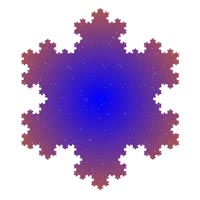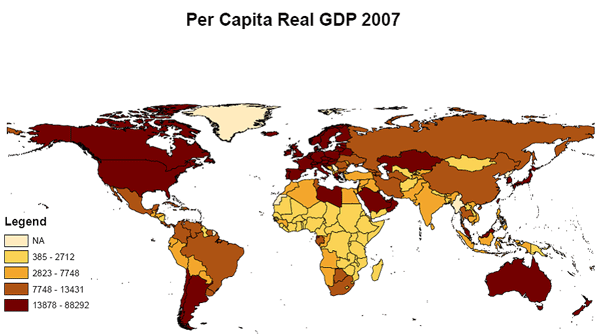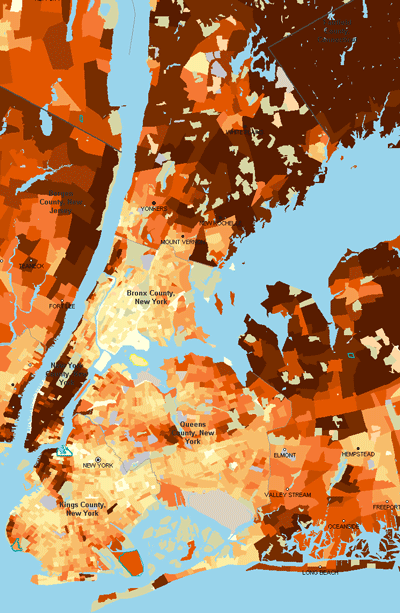Beautiful fractals and ugly inequality
UPDATE 4pm: is there any point to this post? see end of text UPDATE II: 4:30pm Critic cuts me some slack. see end of text
UPDATE III 11am, 9/10/10: Paul Krugman says he had the idea first (see end of text)
In our ceaseless search for trendy themes, let's consider today the beauty of fractals. The picture below shows one fascinating kind of fractal called a "Koch snowflake." Fractals have the same amount of "jaggedness" or "unevenness" at every scale.
Income inequality behaves like a fractal: income is very uneven at large scales and at small scales. Here's a mapping exercise that illustrates this, with a tastefully chosen color scheme that is consistent across all maps (rich is red or brown-red, poor is pale yellow, in between is orange).
We are going to go from global to the US to the New York City metro area to the neighborhood of NYU in Manhattan. At each scale, there is a remarkably high level of inequality across space.
The rich coastal cities in the US and the poor rural South. Rich lower and midtown Manhattan and poor South Bronx. Rich West Village and Soho and poor Lower East Side.
Inequality is one of the hardest policy problems, so more later. A simpler insight of economics is that the most obvious answer to inequality is exactly wrong -- complete redistribution (i.e. a 100 percent tax on everyone above average to go to everyone below average) would destroy incentives for wealth creation and make everyone worse off.
Fractals have the same amount of "jaggedness" or "unevenness" at every scale.
Income inequality behaves like a fractal: income is very uneven at large scales and at small scales. Here's a mapping exercise that illustrates this, with a tastefully chosen color scheme that is consistent across all maps (rich is red or brown-red, poor is pale yellow, in between is orange).
We are going to go from global to the US to the New York City metro area to the neighborhood of NYU in Manhattan. At each scale, there is a remarkably high level of inequality across space.
The rich coastal cities in the US and the poor rural South. Rich lower and midtown Manhattan and poor South Bronx. Rich West Village and Soho and poor Lower East Side.
Inequality is one of the hardest policy problems, so more later. A simpler insight of economics is that the most obvious answer to inequality is exactly wrong -- complete redistribution (i.e. a 100 percent tax on everyone above average to go to everyone below average) would destroy incentives for wealth creation and make everyone worse off.
UPDATE: a commentator on Facebook asked me what the implications are. Reminds of the World Bank research managers, who if you told them it was raining, they would ask "but what are the policy implications?" Finally a chance for revenge through my favorite Mark Twain quote (from preface to Huckleberry Finn):
Persons attempting to find a motive in this narrative will be prosecuted; persons attempting to find a moral in it will be banished; persons attempting to find a plot in it will be shot. By Order of the Author.
Please be content every now and then to just contemplate how the world is, which is kinda necessary before you immediately try to fix it.
UPDATE II: my Facebook critic and also @viewfromthecave grant permission for me to meditate on this for a while, and just try to convince you IT'S INTERESTING; note that fractal genius Mandelbrot thought cotton prices were interesting. (If you do want my Comprehensive Solution, see here.)
UPDATE III: Paul Krugman noted this post and self-deprecatingly notes he had the idea first of the fractal nature of inequality. No problem, Professor Krugman, you can have it. As a long-time fan of your theoretical research, could I request that you take some time out from NYT to come up with a nice theory of why inequality behaves fractally?
 From Aid to Equality
From Aid to Equality




